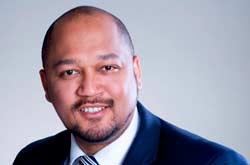With the likes of Eusebius McKaiser, Dr Yuri Maltsev and Clem Sunter on the bill, the opening sessions of the 46th annual South African Property Owners’ Association (Sapoa) Convention and Property Exhibition in Cape Town in June is set to kick-off on a provocative note.

Sponsored by Liberty Properties, the 46th annual Sapoa International Convention and Property Exhibition will take place at the Cape Town International Convention Centre from 10 to 12 June 2014.
Sponsored by Liberty Properties, the event will take place from 10 to 12 June.
The opening sessions are expected to set the tone and stimulate the thoughts of the more than 1 000 local and international commercial and industrial property heavyweights attending South Africa’s premier annual property conference.
McKaiser is a noted Joburg-based broadcaster, columnist, political analyst, writer and lecturer.
As Master of Ceremonies at the convention, he will no doubt facilitate panel discussions with provocative questions of his own in line with the conference theme, titled “Making a difference”.
Maltsev, the former economics advisor to former Russian President, Mikhail Gorbachev, will deliver a hard-hitting presentation entitled “Lessons for SA from the Soviet Union on the Savagery of Socialism” in the convention’s opening session.
Top scenario strategist, Sunter, who is famed for his “South Africa highroad, low road” scenario, will then present a five-year view to 2020. He will be joined by Maltsev in a panel discussion on prospective scenarios for the next five years.
McKaiser who has an academic background in moral philosophy – including a stint as a Rhodes Scholar at Oxford University – believes business needs to have a moral compass to make a bigger difference in society.
“Moral philosophy allows us to think about business and ethics with the help of the tools of the discipline of philosophy,” he explains.
For example, he says while real estate business owners need only comply with laws, moral philosophy rightly pushes the responsible business owner to ask themselves questions such as: Do we have moral duties as businesses beyond complying with laws?
In a country like South Africa with massive housing challenges, moral philosophy can guide this business ethics discussion. Business ethics in South Africa is sadly hugely underdeveloped. At best, businesses see ‘business ethics’ as referring to ‘professional business ethics codes’ such as codes of conduct for doctors, lawyers, etc, he points out.
“There is a refusal to engage in more fundamental ethical questions with a moral edge such as: How can and should ‘Big Business’ contribute to the reduction in inequality in SA?”
Maltsev, who is now an economics professor at Carthage College in Wisconsin, believes the world can learn important lessons from the demise of the old Soviet empire.
He is a noted scholar on the former Soviet economy with a master’s degree from Moscow State University and a Ph.D. in Labour Economics from the Moscow-based Institute of Labour Research in Russia.
“The lessons we can learn from the tragic experiences of nations enslaved in the Soviet empire provide us with a better perspective on our own situation, on dangers of our own big and out of control governments pursuing socialist schemes,” says Maltsev.

Eusebius McKaiser is a noted Joburg-based broadcaster, columnist, political analyst and writer, who will be the Master of Ceremonies at the 46th annual South African Property Owners’ Association Convention and Property Exhibition in Cape Town in June.
Soviet Russia was the first country to completely abolish property rights, which were declared “a sanctification of capitalist oppression and exploitation”.
Soviets pursued the expropriation of private property with fanatical zeal and brutality. When the massive expropriation was completed, the real estate market was destroyed and so were real estate assets, according to Maltsev.
He explains that the most fundamental institution of the market economy is a regime of private property rights. This is generally the defining difference between wealthy, stable, prosperous societies and poor, decimated nations.
The system of private property is the most important guarantee of freedom, not only for those who own property, but scarcely less for those who do not, he says.
“Government housing all over the world (United States included) looks grey, grim and dilapidated. It is an important reminder that right to own property is the most important human right – 'a mother of all rights' - according to a great American James Madison,” says Maltsev.
McKaiser, Maltsev and Sunter will be joined by a host of other noted property and corporate sector leaders speaking at the 2014 SAPOA Convention. Other highlight sessions include:
- a spotlight on Real Estate Investment Trusts (REITs) as an investment vehicle both globally and in SA
- a session on the economy in relation to the SA property market
- the Sapoa Property Journalism Awards and Sapoa Innovative Excellence Awards for property development
- a debate on the controversial question of municipal rates and taxes
- a presentation on the retail sector titled “The Real Estate Landscape in 2020”, by Luxembourg-based Kees Hage, global real estate leader and partner at PwC.
Visit the website for more information.








